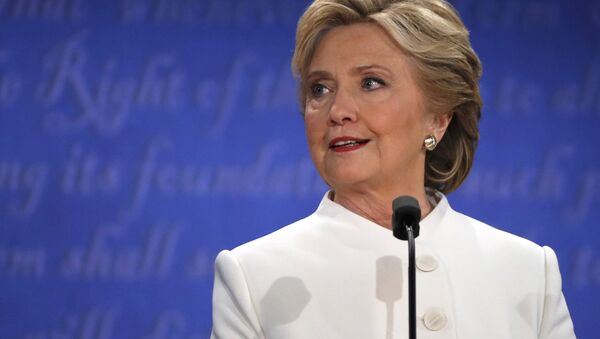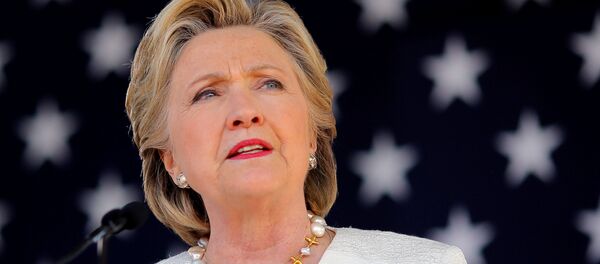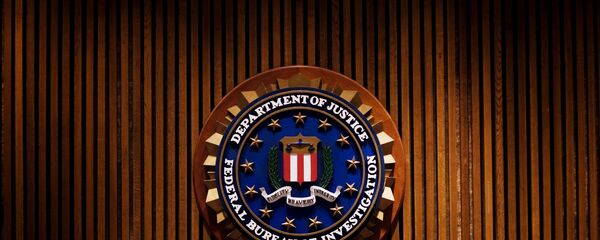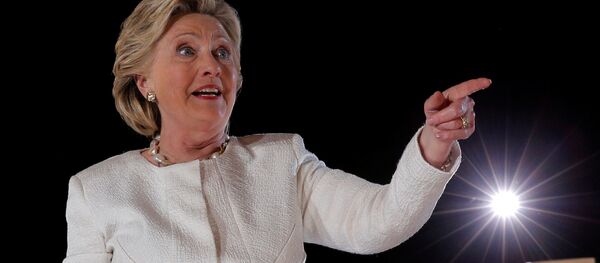Hillary Clinton's reinvigorated foreign policy stance is intended to produce an effect on US voters, with Clinton staking out a clear position as a "strong leader," and a clear alternative to her rival, Republican presidential nominee Donald Trump, Stephen Ebert, US political commentator and expert at the Agency for Strategic Communications, believes.
Citing Clinton's top aides the Wall Street Journal reported last Thursday that if the Democratic presidential nominee comes out on top in the result of the November election, she will take "a more aggressive posture" in Syria, "work to impose a no-fly zone," and will consider tougher sanctions on both Russia and Iran.
Hillary Clinton: 'Strong Leader' and 'Clear Alternative to Trump'
"I believe this is more focused on the US electorate, with Clinton staking out a clear position as a 'strong leader, and a clear alternative to Trump," Ebert told Sputnik.
"I believe her overall positioning actually gives her more room for maneuver domestically since typically Democrats are seen as weak on 'defense' — and internationally. Obama was clearly viewed this way, and it always undermined him, drove him to some rash decisions he likely did not really want to make (for example, Syria)," Ebert pointed out.
Will Clinton really try to establish a no-fly zone over Syria and risk a direct confrontation with Russia, if elected?
"She may well continue to threaten this, but if she has good advisers and intelligence (a troubling question mark since lately our 'intelligence' has ceased to be 'impartial'), she will be told this act would indeed risk war, and would actually damage the concept of 'the whole world' being in agreement with the US," the political commentator responded.
"Such increased aggression — with the US being viewed outside the EU as the illegal interloper — would run the risks of increasing at least Chinese active opposition," he remarked.
"Domestically speaking, Clinton will likely also find her hands tied by an even more aggressive and uncooperative political opposition, one more hostile to her than it was even to Obama. This may well prevent her from taking a number of 'unilateral' steps," Ebert believes.

Clinton Has No Leverage to Reinforce Unipolar World Order
"Despite Clinton's foreign policy positions, and hard line on Russia, she has been an extremely savvy and competent politician," Ebert highlighted.
The political commentator drew attention to the fact that unlike Obama, Hillary Clinton "is more of a realist."
"While continuing to espouse his line of 'US exceptionalism,' she may well understand the world is increasingly rejecting that concept," the expert underscored.
"If she were to continue to enforce the monopolar world view, she will hugely damage her domestic agenda, which is correctly largely focused on addressing the many social and economic ills facing the country — crumbling infrastructure, growing internal strife, with all groups pitted against one another, and the continued growth in income inequality," Ebert elaborated.
"She is also shrewd enough to know that if she does not address an ever declining middle class, and growing poverty, she will be tossed out in the next election. Last but not least, the US economy, predictably cyclical in nature with a collapse every 8-10 years or so, having now gone thru 6-7 years of albeit slow growth and recovery, is now due for yet another downturn," he pointed out.

Clinton Will Have to Come to Terms With Russia, China if Elected
In his latest opinion piece for The Financial Times, Robert John Sawers, the former head of Britain's Secret Intelligence Service, proclaimed that the US unipolar era has finally ended and the next US president needs to avoid confrontation with Russia and China, treating them as "great powers" in the first place. Will Clinton or Trump follow Sawers' advice when elected?
"I do with regard to Clinton because despite her seeming aggression, she is, in my view, the only one of the two who has experience and the temperament to deal with larger world issues," the political commentator highlighted.
"First, a large increase in US defense spending and capabilities, and a call not for 'disbanding' NATO, but rather, in typical Trumpian 'money'-based reasoning, simply 'demanding' NATO countries pay their 'fair share' — a fair share which will then be directed only at military spending. Against whom, is the only question," Ebert stressed.
He also recalled Trump's controversial remark made by him following a Russian Su-27 plane maneuver over a US ship in the Baltic Sea in April.
In an interview on BuzzFeed radio show K File the Republican presidential nominee said that if a rival refuses to stop such approaches to American military assets, the US should begin shelling at it.
"You know, at a certain point, when that sucker comes by you, you gotta shoot," Trump said, as quoted by Newsweek.
"[Trump] has already stated on many occasions his willingness to take drastic actions — from shooting down Russian planes that 'fly too close,' or ready to take military action against Iran because it sailors 'gave the finger' to American warships," Ebert underscored.
Indeed, as General Joseph Dunford, Chairman of the Joint Chiefs of Staff, told the Senate Armed Services Committee on September 22, "for us to control all of the airspace in Syria it would require us to go to war, against Syria and Russia."
"That's a pretty fundamental decision that certainly I'm not going to make," Dunford stressed.
"Clinton will have to come to terms not simply with Russia defending the sovereign right of nations — opposing US hegemony, but the sheer folly of pursuing a harder line against China," Ebert continued.
"China is hugely critical to US economic success — a huge market, a major supplier of capital and investments, and a continuing source of cheap goods for the average, ever poorer US consumer. Not to mention that continued sanctions against Russia, largely hurting the EU (but not the US) are stalling EU economic recovery, and thus leading to more and more to the rise of the power of 'nationalist,' right-wing forces in Europe, forces which do not bode well for the US and overall world stability," the political commentator concluded.
During her latest press briefing Russian Foreign Ministry spokesperson Maria Zakharova called attention to a paradoxical fact: politicians who had blamed Russia for almost everything changed their mind after being elected and tried to forge closer ties with Russia. However, those who had spoken about Russia in a positive way later became tougher toward Russia.





